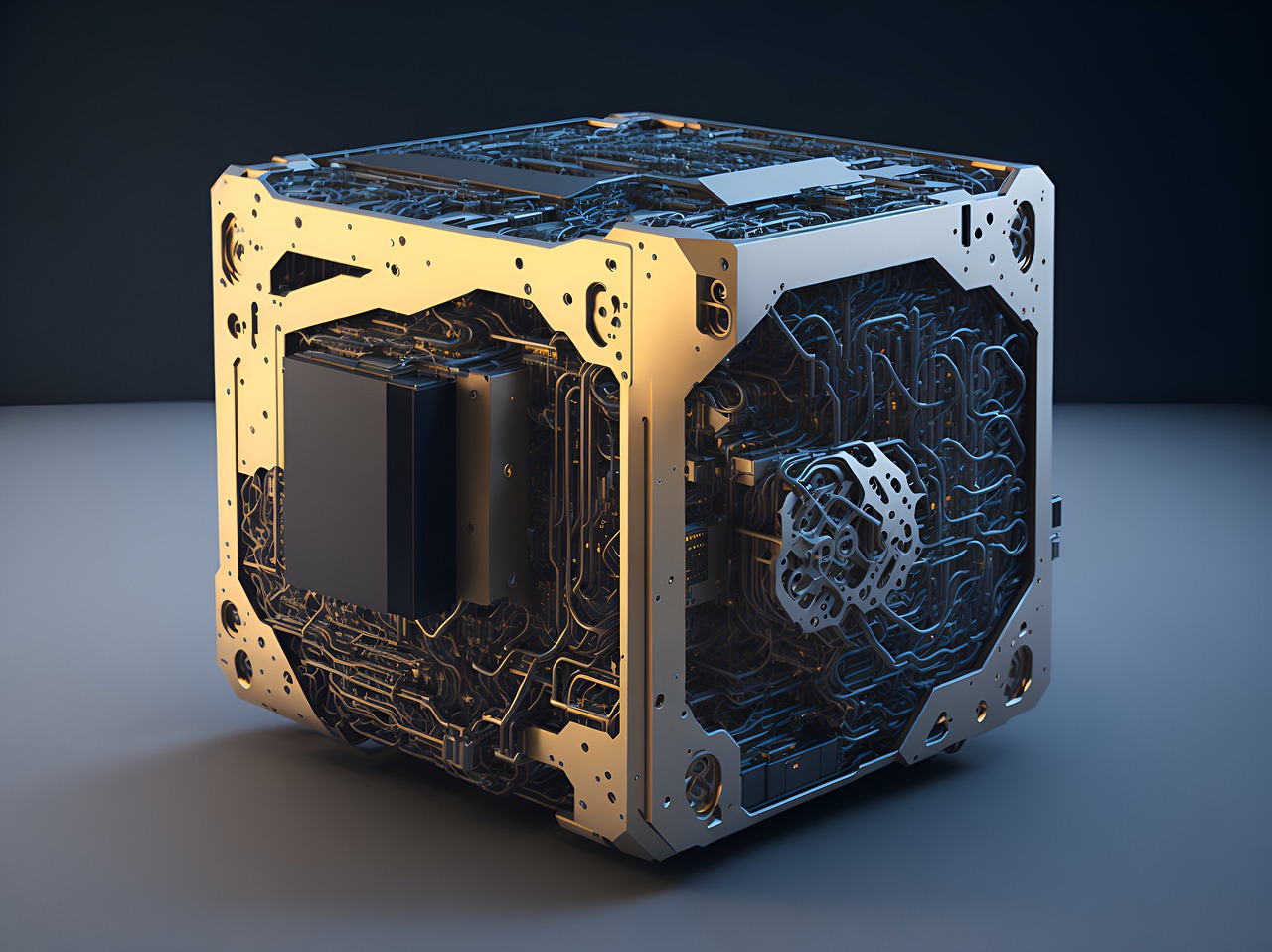In this article, we will explore the fascinating intersection between quantum computers and the future of AI. As technology continues to advance at an exponential rate, scientists and researchers are harnessing the power of quantum computing to push the boundaries of what is possible in the field of artificial intelligence. Quantum computers possess unparalleled processing capabilities that have the potential to revolutionize the way AI systems are designed, developed, and optimized. Join us as we delve into the exciting possibilities that lie ahead in this fascinating realm where quantum meets AI.
The Basics of Quantum Computing
The principles of quantum computing
Quantum computing is a revolutionary field that explores the principles of quantum mechanics to develop computing systems capable of solving complex problems at an unprecedented speed. Unlike classical computers that use bits to process and store information, quantum computers utilize quantum bits, or qubits, which can exist in multiple states simultaneously, thanks to the phenomena of superposition and entanglement. This allows quantum computers to perform calculations in parallel and process vast amounts of data simultaneously, making them incredibly powerful.
Key components of a quantum computer
A quantum computer consists of several essential components that work together to harness the power of quantum mechanics. At its core, there is the qubit, the basic unit of quantum information. These qubits can be realized using various physical systems such as superconducting circuits, trapped ions, or topological systems. Additionally, a quantum computer requires a quantum processor to manipulate and operate on the qubits. This processor, often kept at extremely low temperatures, performs the necessary quantum operations to carry out computations. Finally, quantum computers rely on quantum algorithms, specifically designed to take advantage of the unique properties of qubits, to solve complex problems efficiently.
Advantages of quantum computing over classical computing
The advent of quantum computing brings several advantages over classical computing systems. One of the most significant advantages is the potential for exponential speedup in computations. Quantum computers can tackle problems that would take classical computers an impractical amount of time to solve. Complex optimization problems, cryptography, and simulations of quantum systems are just a few examples of areas where quantum computers could revolutionize the speed and efficiency of calculations. Additionally, quantum computing has the potential to address certain computational limitations in machine learning algorithms, enabling more accurate and efficient predictions. These advantages hold great promise for diverse fields, ranging from scientific research to finance and healthcare, where complex computations are crucial.
Understanding Artificial Intelligence
What is artificial intelligence?
Artificial Intelligence, or AI, refers to the ability of machines or computer systems to perform tasks that typically require human intelligence. It involves the development of algorithms and models capable of simulating and replicating human cognitive processes, such as learning, reasoning, and problem-solving. AI enables computers to analyze vast amounts of data, recognize patterns, and make informed decisions or predictions. This technology has found applications in various domains, including natural language processing, computer vision, robotics, and virtual assistants.
Types of artificial intelligence
AI can be broadly categorized into three types: narrow AI, general AI, and superintelligent AI. Narrow AI, also known as weak AI, is designed to perform specific tasks and is limited to the domain it is programmed for. Examples of narrow AI include voice recognition systems, recommendation algorithms, and image recognition software. On the other hand, general AI refers to systems that possess the ability to understand, learn, and perform any intellectual task that a human can do. General AI is still largely theoretical and has not been achieved. Lastly, superintelligent AI represents a hypothetical stage where AI surpasses human intelligence across all domains, leading to potentially unparalleled advancements and impacts.
Applications of artificial intelligence
AI has made significant contributions to various sectors, transforming industries and improving efficiency and decision-making processes. In fields such as healthcare, AI-powered algorithms enable early disease detection, personalized treatment plans, and medical image analysis. In transportation, AI aids in autonomous vehicle technology, optimizing routes, and improving logistics. AI also plays a crucial role in financial services, helping detect fraudulent transactions, assessing creditworthiness, and providing personalized investment advice. Additionally, AI is prevalent in the entertainment industry, enabling recommendation systems, facial recognition technology, and creating realistic virtual environments.

The Intersection of Quantum Computing and AI
Enhancing machine learning algorithms with quantum computing
One of the most promising aspects of the intersection between quantum computing and AI is the potential to enhance machine learning algorithms. Machine learning algorithms rely on immense computational power for training, optimizing, and making predictions based on large datasets. Quantum computers offer a unique advantage in this regard, as they can efficiently process and analyze vast amounts of data in parallel. The principles of quantum mechanics open doors to novel approaches in machine learning, such as quantum neural networks and quantum-inspired optimization algorithms. These advancements have the potential to improve the accuracy, speed, and efficiency of machine learning algorithms, enabling breakthroughs in areas such as image recognition, natural language processing, and recommendation systems.
Optimizing data processing and analysis
Data processing and analysis are fundamental components of AI. Quantum computers have the ability to manipulate and analyze massive datasets in parallel, thanks to the superposition and entanglement properties of qubits. This parallelism allows quantum computers to explore multiple possibilities simultaneously, potentially accelerating data processing tasks. Quantum algorithms, like the Quantum Fourier Transform, can efficiently process large volumes of data with fewer computational resources, leading to faster and more accurate analysis. By leveraging quantum computing’s capabilities, complex data analysis tasks in AI can be performed at greater speed and scale, paving the way for more accurate predictions and insights.
Improving pattern recognition and optimization problems
Pattern recognition is a crucial aspect of AI, enabling systems to identify and extract meaningful information from data. Quantum computers hold promise in enhancing pattern recognition capabilities by leveraging their unique properties. Quantum machine learning algorithms can identify complex patterns in datasets with higher accuracy and efficiency compared to classical counterparts. These algorithms exploit quantum interference and advanced dimensional analysis methods, enabling improved recognition and classification of patterns. Additionally, quantum computing can also address complex optimization problems by efficiently searching through vast solution spaces. Enhanced pattern recognition and optimization capabilities open up new possibilities for AI applications, ranging from computer vision to fraud detection, and portfolio optimization.
Potential Impact on AI Research and Innovation
Speeding up complex computations
Quantum computing has the potential to significantly speed up complex computations that are currently a bottleneck in AI research. AI algorithms often involve computationally intensive tasks, such as training deep neural networks, simulating complex environments, or optimizing complex objective functions. These tasks can take considerable time and resources to execute on classical computers. By harnessing the power of quantum computing, these computations can be accelerated due to the quantum computer’s ability to process information in parallel. This acceleration can lead to faster training times, quicker simulations, and more efficient optimization, ultimately driving progress in AI research and innovation.
Solving problems beyond classical capabilities
While classical computers have made significant advancements in AI, they still face limitations when it comes to solving certain types of problems. Quantum computers have the potential to solve problems beyond classical capabilities, thanks to their unique properties. For instance, quantum machine learning algorithms can identify subtle patterns in highly complex datasets that might not be feasible for classical algorithms. Additionally, quantum computers can tackle optimization problems with a vast number of variables more efficiently and effectively. By leveraging quantum computing, AI research can push the boundaries of what is currently achievable, unlocking new possibilities and insights.
Exploring new avenues for AI research
The intersection of quantum computing and AI presents exciting opportunities for exploring new avenues of research. Quantum computers can be used to simulate quantum systems, allowing researchers to study quantum algorithms and advance the understanding of quantum mechanics itself. This knowledge can further enhance machine learning algorithms, leading to improved AI models and techniques. Moreover, quantum machine learning researchers can develop new quantum algorithms and protocols specifically optimized for quantum hardware. The exploration of these new research avenues can accelerate progress in both quantum computing and AI, fostering innovation and driving breakthroughs in the field.

Challenges and Limitations of Quantum Computers in AI
Noise, errors, and maintaining quantum states
One of the significant challenges in quantum computing is dealing with noise, errors, and maintaining the fragile quantum states of qubits. Quantum systems are highly sensitive to external disturbances, which can cause errors and degrade the integrity of the computations. Quantum error correction techniques, such as quantum error correction codes, are being developed to mitigate this issue. However, effectively handling errors and maintaining qubit coherence pose significant challenges. The challenge of noise and maintaining quantum states is particularly relevant in the context of AI, as errors in quantum computations can have a significant impact on the accuracy and reliability of AI algorithms.
Scalability and qubit coherence
Another challenge lies in scalability and qubit coherence. Currently, quantum computers have a limited number of qubits due to technological constraints and the difficulty of maintaining coherence. As more qubits are added, the complexity of the system increases, making it harder to maintain coherence and minimize errors. This limits the size and complexity of problems that quantum computers can currently tackle. Achieving scalable and coherent quantum systems is vital to overcome this limitation and unlock the full potential of quantum computing in AI. Researchers and engineers are actively working on developing technologies and techniques to improve qubit scalability and coherence, but further advancements are needed.
High costs and limited accessibility
Quantum computers are still in the early stages of development and are expensive to build and maintain. The specialized infrastructure required to keep the quantum computers at extremely low temperatures adds to the cost. These high costs and limited accessibility pose challenges for researchers and organizations looking to leverage quantum computing for AI applications. The limited accessibility also restricts the number of researchers who can experiment and develop quantum algorithms for AI. However, as the field progresses, advancements in technology and increased interest from various sectors, including AI, may drive down costs and make quantum computing more accessible to a wider audience.
Quantum Computers and AI in Practice
Current applications of quantum computers in AI
While the practical implications of quantum computers on AI are still being explored, there are already some notable applications. For example, quantum machine learning algorithms can be used to optimize the training of deep neural networks, leading to faster convergence and improved performance. Quantum-inspired optimization algorithms can also be utilized to solve complex optimization problems relevant to AI applications. Additionally, quantum computers can be used to simulate quantum systems, aiding in the development of quantum algorithms for AI research. These current applications provide a glimpse of the potential power of quantum computers in AI and pave the way for future advancements.
Future possibilities and advancements
The future of quantum computers in AI holds immense potential for groundbreaking advancements. With continued research and development, quantum machine learning algorithms could surpass classical algorithms in accuracy, efficiency, and scalability. Quantum computers can enable faster and more accurate pattern recognition, leading to significant advancements in computer vision, natural language processing, and robotics. Furthermore, the intersection of quantum computing and AI could lead to quantum-inspired AI systems, merging the best of both worlds to create even more intelligent and capable solutions. The possibilities are vast, and as quantum computing technology matures, we can expect to witness remarkable advancements and applications in AI.
Critical considerations and ethical implications
As the integration of quantum computers and AI progresses, it becomes essential to address critical considerations and ethical implications. One key aspect is the security of AI systems powered by quantum computing. While quantum computers offer tremendous computational power, they also pose a risk to existing encryption systems. Cryptographic algorithms that were previously considered secure may become vulnerable in the face of quantum computing. Addressing security concerns and developing quantum-safe encryption methods will be crucial to ensure the secure deployment of AI systems.
Another ethical consideration lies in the potential societal impact of AI advancements powered by quantum computing. As AI becomes more intelligent and capable, there is a need for responsible development and deployment practices. Ensuring fairness, transparency, and accountability in AI systems is of utmost importance. Ethical frameworks and regulations must be established to guide the development, deployment, and use of AI technologies to prevent bias, discrimination, or the misuse of AI capabilities. Striking the right balance between technological progress and ethical responsibility will be vital in shaping the future of AI and quantum computing.

The Role of Quantum Machine Learning
Quantum neural networks
Quantum neural networks represent an exciting field within quantum machine learning. Inspired by classical neural networks, these quantum counterparts employ quantum algorithms to process and analyze data. Quantum neural networks leverage the principles of quantum mechanics, such as superposition and entanglement, to perform computations in a more efficient and parallel manner compared to classical approaches. Quantum neural networks have the potential to enhance pattern recognition, optimization, and other aspects of AI, leading to more accurate and efficient AI algorithms.
Quantum algorithms for machine learning
Quantum algorithms specifically designed for machine learning play a vital role in leveraging the power of quantum computing. These algorithms exploit the unique properties of qubits to enhance various aspects of machine learning, such as data processing, optimization, and unsupervised learning. Quantum adiabatic algorithms, quantum support vector machines, and variational quantum algorithms are just a few examples of quantum algorithms being developed for machine learning applications. These algorithms aim to improve the efficiency and accuracy of machine learning tasks and open up new possibilities for AI research and innovation.
Potential breakthroughs and advancements in quantum machine learning
Quantum machine learning has the potential to unlock breakthroughs and advancements in AI. By harnessing the power of quantum computing, AI algorithms can benefit from increased speed, improved accuracy, and enhanced optimization capabilities. Quantum machine learning holds promise in solving complex problems, such as protein folding prediction, drug discovery, and natural language processing, more efficiently than classical approaches. Additionally, quantum machine learning has the potential to improve the efficiency of generative models and enhance the ability to learn and reason from limited data. These potential breakthroughs and advancements pave the way for a future where AI systems are more powerful, robust, and capable.
Quantum Computing Startups and their AI Contributions
Emerging startups in the quantum computing and AI sector
The intersection of quantum computing and AI has attracted the attention of numerous startups worldwide. These emerging companies aim to harness the power of quantum computing to revolutionize AI and solve some of the most challenging problems. Startups such as Quantum Machines, Xanadu, and Rigetti Computing are developing quantum computing hardware, software, and algorithms specifically designed for AI applications. These startups are actively pushing the boundaries of quantum computing and AI research, and their contributions hold the potential to shape the future of AI.
Innovations and developments from startup initiatives
Startups in the quantum computing and AI sector have been instrumental in driving innovations and developments. They have played a crucial role in advancing quantum hardware, developing quantum algorithms for machine learning, and exploring new avenues of research. Many startups focus on developing software and frameworks that allow researchers and developers to experiment and work with quantum computers more easily. These initiatives streamline the development of quantum algorithms for AI and encourage collaboration among researchers and organizations. By providing accessible tools and platforms, startups contribute to the democratization of quantum computing and accelerate progress in AI research and innovation.
Collaboration and partnerships with established AI companies
Collaboration and partnerships between quantum computing startups and established AI companies have become increasingly prevalent. Established AI companies recognize the potential of quantum computing and seek to leverage its power to enhance their AI capabilities. Collaborations involve cross-pollination of ideas, research, and resources to drive advancements in both quantum computing and AI. Startups bring their expertise in quantum hardware and algorithms, while established AI companies provide domain knowledge and real-world use cases. These collaborations not only accelerate progress but also facilitate the practical integration of quantum computing into AI applications, bridging the gap between theory and practice.

The Future of AI and Quantum Computing
Predictions and forecasts for the future of AI and quantum computing
The future of AI and quantum computing holds immense promise and potential. Experts predict that as quantum computing technology advances, it will have a transformative impact on AI research and innovation. Quantum machine learning algorithms are expected to outperform classical algorithms in terms of accuracy, efficiency, and scalability. These advancements will pave the way for breakthroughs in various AI applications, ranging from healthcare and finance to cybersecurity and climate modeling. Furthermore, the integration of quantum computing with AI is expected to open doors to new research avenues and enable AI systems with unprecedented capabilities.
Entanglement of AI and other emerging technologies
The entanglement of AI and other emerging technologies will shape the future landscape of innovation. AI’s interaction with quantum computing is just one example of how different technologies can synergize and complement each other. AI’s convergence with other domains, such as blockchain, Internet of Things (IoT), and 5G, will lead to new possibilities and paradigms. For instance, combining AI and quantum computing with blockchain can enhance data security and privacy. The entanglement of AI with other emerging technologies is expected to drive exponential advancements and create disruptive solutions, ultimately transforming industries and society as a whole.
Impacts on industries and society as a whole
The integration of AI and quantum computing has the potential to revolutionize industries and impact society on a large scale. Industries such as healthcare, finance, transportation, and manufacturing stand to benefit from the advanced computational capabilities offered by quantum computing-empowered AI. Improved disease diagnosis and treatment, personalized financial services, autonomous transportation systems, and efficient supply chain management are just a few examples of the impacts on industries. Moreover, the democratization of AI and quantum computing can bridge the digital divide and empower individuals and communities with novel tools and opportunities. However, it is crucial to address the ethical, social, and economic implications to ensure equitable distribution and responsible use of these technologies.
Conclusion
In conclusion, the impact of quantum computing on the future of AI is tremendous. Quantum computing brings novel principles and capabilities that significantly enhance the speed, accuracy, and efficiency of AI algorithms. The principles of quantum mechanics enable quantum machine learning algorithms, superior optimization techniques, and advanced pattern recognition capabilities. Quantum computers hold a promise to solve complex problems beyond the reach of classical computers and unlock new avenues for AI research and innovation. However, challenges such as noise, scalability, and high costs must be addressed to fully realize the potential of quantum computing in AI. Despite these challenges, the intersection of quantum computing and AI has already given rise to startups, collaborations, and practical applications, which will accelerate progress in the field. The future holds exciting possibilities for the entanglement of AI and quantum computing, with implications for industries, society, and the way we understand and interact with AI systems. As we move forward, it is crucial to navigate these transformative technologies with responsibility, ethics, and a commitment to inclusive development to shape a future where AI and quantum computing serve the common good.










